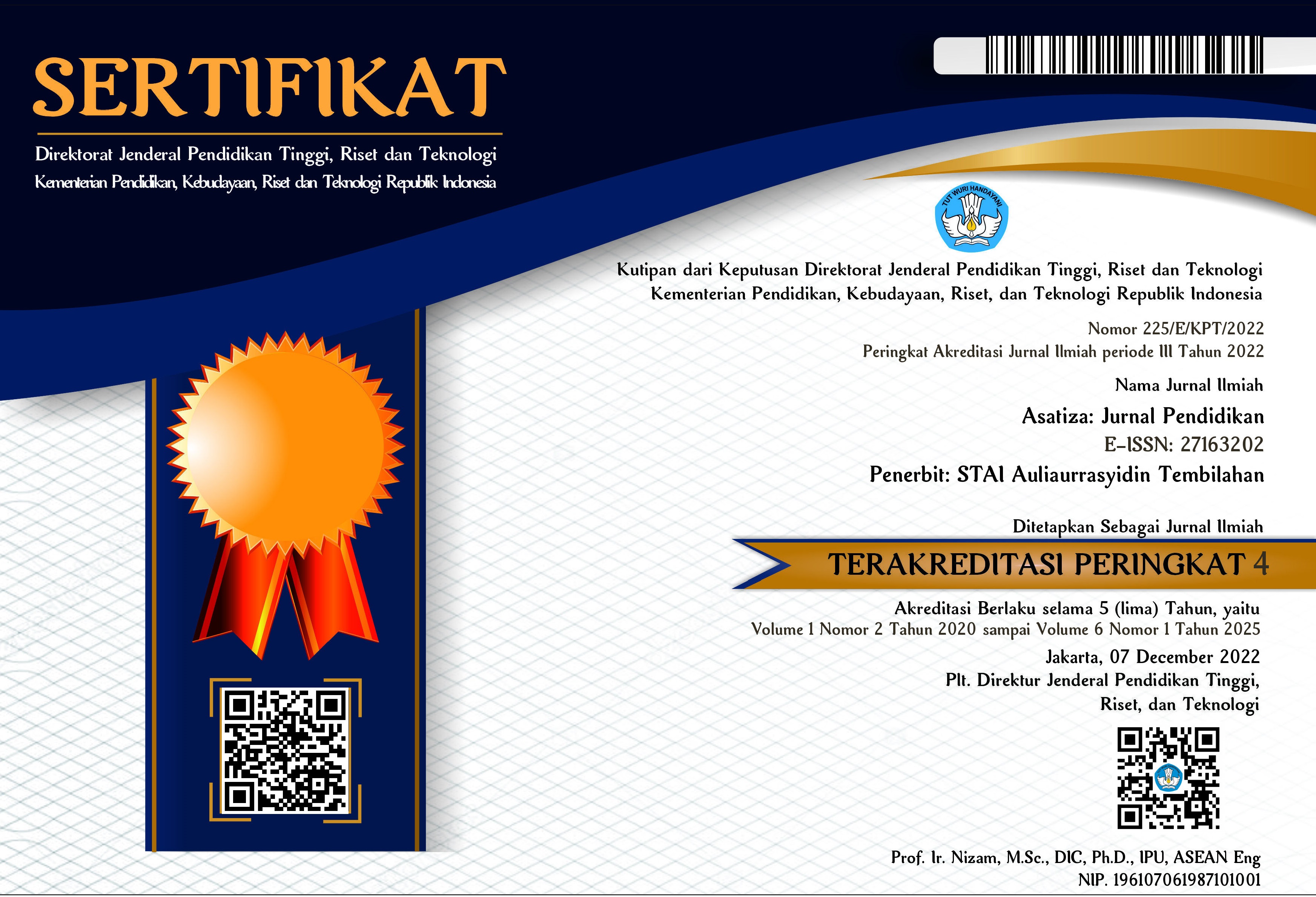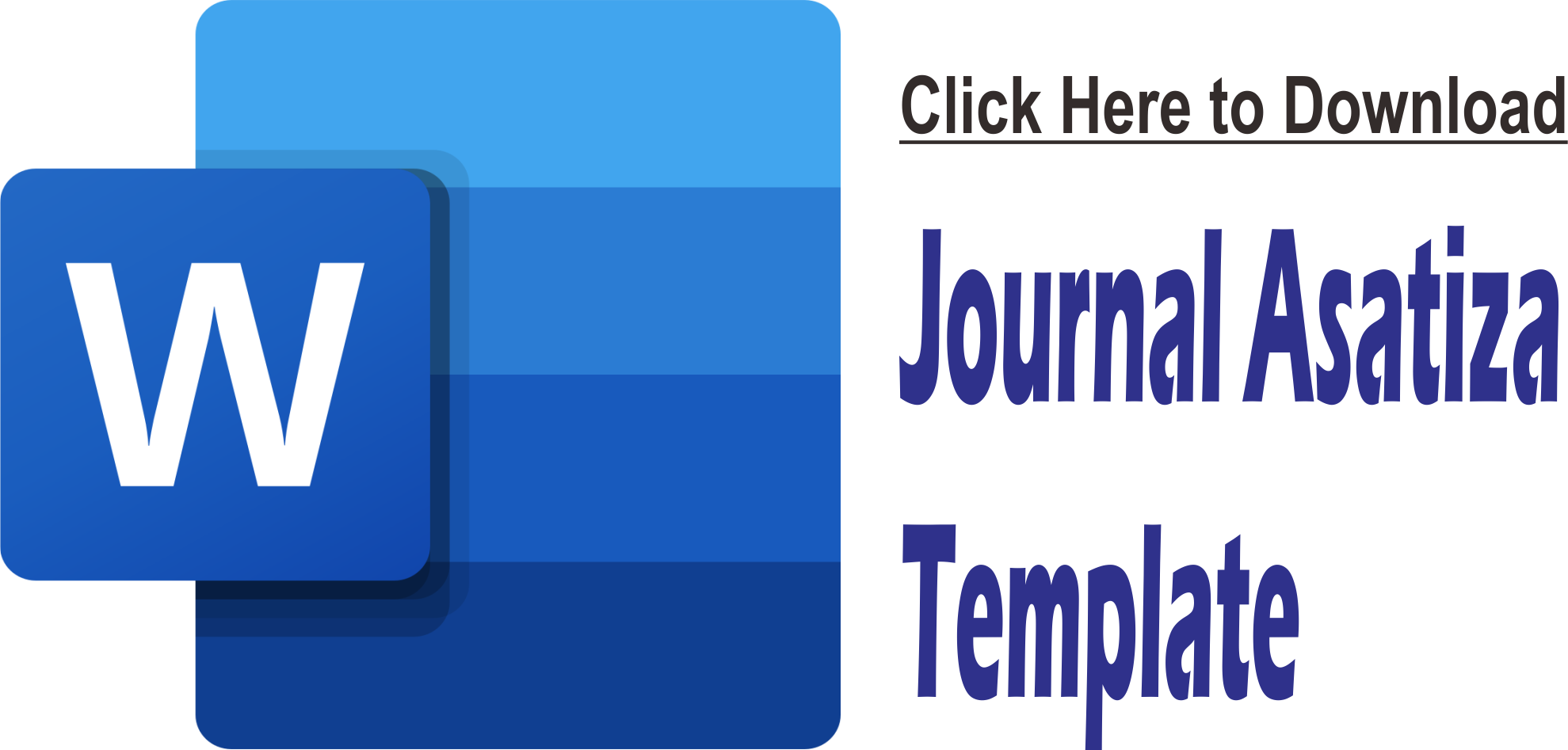National Assessment at West Tanjung Jabung 2 Public High School (Teachers’ Perspective)
DOI:
https://doi.org/10.46963/asatiza.v4i1.861Keywords:
National Assessment, Perspective, TeacherAbstract
This study aims to describe the teachers’ perspective towards the National Assessment at State Senior High School 2 Tanjung Jabung Barat. This research was qualitative descriptive that describes or expresses in words (qualitatively). Data was collected by interviewing the teachers. The results of this study indicate that: The teacher's understanding of the national assessment is quite good, this can be seen from the teacher's knowledge regarding the national assessment and the results of teacher interviews regarding the teacher's views on the national assessment policy. Besides that, the teacher's knowledge of the reasons the government established the national assessment policy, which in this case, allows the teacher to play a very important role in the national assessment. However, the teacher's knowledge regarding minimum competency assessment, character surveys, and learning environment surveys are quite good. The Implementation of the national assessment in teaching and learning activities have been carried out. (2) obstacles were the lack of student motivation, lack of student ability, and lack of outreach and training for teachers.
Downloads
References
Adom, D., Mensah, J. A, & Dake, D. A. (2020). Test, measurement, and evaluation: Understanding and use of the concepts in education. International Journal of Evaluation and Research in Education, 9(1), 109–119. https://doi.org/10.11591/ijere.v9i1.20457
Aisah, H., Zaqiah, Q. Y, & Supiana, A. (2021). Implementasi kebijakan asesmen kemampuan minimum (AKM): Analisis implementasi kebijakan AKM). Jurnal Pendidikan Islam Al-Affan, 1(2), 128–135. http://ejournal.stit-alquraniyah.ac.id/index.php/jpia/article/view/25
Andiani, D., Hajizah, M. N., & Dahlan, J.A. (2021). Analisis rancangan assesmen kompetensi minimum (AKM) numerasi program merdeka belajar. MAJAMATH: Journal of Mathematics and Mathematics Education. Majamath, 4(1). http://ejurnal.unim.ac.id/index.php/majamath/article/view/1010
Fauziah, A., Fitriani, E., Sobari, D., & Robandi, B. (2021). Analisis pemahaman guru sekolah menengah pertama (smp) mengenai asesmen kompetensi minimum (AKM). Educative: Jurnal Ilmu Pendidikan, 3(4), 1550–1558. https://doi.org/10.31004/EDUKATIF.V3I4.608
Firma, I., Dian, N., Marini, A., & Sumantri, MS (2021). Analisis kebijakan dan pengelolaan pendidikan terkait standar penilaian di Sekolah Dasar. Jurnal Basicedu, 5(3), 1479–1491. https://doi.org/10.31004/BASICEDU.V5I3.956
Hadiana, D. (2015). Penilaian hasil belajar untuk siswa sekolah dasar. Jurnal Pendidikan dan Kebudayaan, 21(1), 15–26. https://doi.org/10.24832/JPNK.V21I1.173
Harahap, A.C. P., Anggreini, A., Setiawan, B., Ummi, F., Mayarani, L., Sitompul, M. R., Fahmi, M. I, Hsb, R. S. N, & Anggini, Y. C. (2022). Kebermanfaatan Need Assesment bagi Program BK di Sekolah. Jurnal Pendidikan Dan Konseling (JPDK), 4(6), 6606–6610. https://doi.org/10.31004/jpdk.v4i6.9360
Hasanah, M., & Hakim, T. F. L. (2021). Analisis kebijakan pemerintah pada assesmen kompetensi minimum (AKM) sebagai bentuk perubahan ujian nasional (UN). Irsyaduna: Jurnal Studi Kemahasiswaan, 1(3), 252–260. https://doi.org/10.54437/IRSYADUNA.V1I3.344
Iman, N., Usman, N., & Bahrun, B. (2021). Implementasi kebijakan Sekolah Dasar dalam menghadapi asesmen kompetensi minimum. Jurnal Pendidikan: Teori, Penelitian, & Pengembangan, 6(2), 250–260. https://doi.org/10.17977/JPTPP.V6I2.14464
Novrizal, N. (2022). Implikasi asesmen nasional terhadap pengajaran mata pelajaran Pendidikan Agama Islam (PAI. Tarbawi: Jurnal Pemikiran Dan Pendidikan Islam, 5(1), 50–64. https://doi.org/10.51476/TARBAWI.V5I1.337
Nurjanah, E. (2021). Kesiapan calon guru SD dalam implementasi asesmen nasional. Jurnal Papeda: Jurnal Publikasi Pendidikan Dasar, 3(2), 76–85. https://doi.org/10.36232/jurnalpendidikandasar.v3i2.1120
Pasaribu, M. H. (2021). Implementasi sebuah program berbasis riset aksi dalam meningkatkan kualitas program. Education Achievement: Journal of Science and Research, 2(1) 38–46. https://doi.org/10.51178/JSR.V2I1.379
Primayana, H. K. (2015). Manajemen Sumber Daya Manusia dalam Peningkatan Mutu Pendidikan di Perguruan Tinggi. Jurnal Penjaminan Mutu, 1(2), 7–15. https://doi.org/10.25078/JPM.V1I2.45
Raini, A., Khodijah, N., & Suryana, E. (2022). Analisis kebijakan tentang pedagogie dan penilaian pendidikan (AKM = Asesmen Kompetensi Minimum, Survey Karakter dan Survey Lingkungan Belajar). MODELING: Jurnal Program Studi PGMI, 9(1), 131-142. https://doi.org/https://doi.org/10.36835/modeling.v9i1.1136
Ramadan, ZH (2015). Pengembangan penilaian autentik berbasis kurikulum 2013 di kelas IV Sekolah Dasar Negeri kota Pekanbaru. Jurnal Tematik, 5(1), 36-48. https://doi.org/10.24114/jt.v5i01.3201
Rohim, D. C, Rahmawati, S., & Dyah Ganestri, I. (2021). Konsep asesmen kompetensi minimum untuk meningkatkan kemampuan literasi numerasi siswa Sekolah Dasar. Jurnal Varidika - Variasi Pendidikan, 33(1), 54–62. https://doi.org/10.23917/VARIDIKA.V33I1.14993
Rokhim, D. A, Rahayu, B. N, Alfiah, L. N., Peni, R., Wahyudi, B., Wahyudi, A., Sutomo, S., & Widarti, H. R (2021). Analisis kesiapan peserta didik dan guru pada asesmen nasional (Asesmen kompetensi minimum, survey karakter, dan survey lingkungan belajar. JAMP: Jurnal Administrasi dan Manajemen Pendidikan, 4(1), 61–71. http://dx.doi.org/10.17977/um027v4i12021p61
Saftari, M., & Fajriah, N. (2019). Assessment of the affective space in the form of attitude scale assessment to assess learning outcomes. Edutainment: Jurnal Ilmu Pendidikan dan Kependidikan, 7(1), 71–81. https://doi.org/10.35438/E.V7I1.164
Sari, D. Y, Nakita, I. T., & Rahma, F. (2022). Pemahaman guru dalam proses penilaian perkembangan anak usia dini. PERNIK: Jurnal Pendidikan Anak Usia Dini, 5(2), 25–37. https://doi.org/10.31851/PERNIK.V5I2.7910
Setiyowati, H., Suryati, E., Rina, R. (2022). Analisis pelaksanaan asesmen nasional berbasis komputer (ANBK) di Madrasah Ibtidayah Negeri 9 Hulu Sungai Utara. Al-Madrasah: Jurnal Ilmiah Pendidikan Madrasah Ibtidaiyah, 6(3), 803–818. https://doi.org/10.35931/AM.V6I3.1086
Sudianto, S., & Kisno, K. (2021). Potret kesiapan guru Sekolah Dasar dan manajemen sekolah dalam menghadapi asesmen nasional. Jurnal Akuntabilitas Manajemen Pendidikan, 9(1), 85–97. https://doi.org/10.21831/JAMP.V9I1.39260
Sugiyono. (2018). Quantitative research methods and R&D.
Sulkimah, N. A, Syahchruroji, A., & Hendracipta, N. (2022). Proses pendampingan belajar peserta didik berbasis AKM (assesmen kompetensi minimum) SDIT Elfatih. Jurnal Ilmiah Pendidikan Dasar: Pendas, 7(2), 712–720. https://doi.org/10.23969/JP.V7I2.6639
Supriyanto, & Rustyawati, D. (2021). Assesmen nasional: Survey kesiapan. PREMIERE: Journal of Islamic Elementary Education, 3(2), 23–36. https://doi.org/10.51675/JP.V3I2.183
Usman, D. (2020). Penerapan prinsip-prinsip evaluasi dalam mata pelajaran Pendidikan Agama Islam (PAI). Cendekia: Jurnal Ilmiah Pendidikan, 8(2), 227-236. https://doi.org/10.33659/cip.v8i2.176
Utami, A. D, Zainudin, M., Suriyah, P., Noeruddin, A., & Hasanudin, C. (2022). Literature of the national assessment program to improve the quality of learning for teachers and prospective teachers in Bojonegoro and surroundings. Publikasi Ilmiah Bidang Pengabdian Kepada Masyarakat (SIKEMAS), 1(1), 1–8. https://doi.org/10.47353/sikemas.v1i1.164
Zulaikhah, D., Sirojuddin, A., & Aprilianto, A. (2020). Analisis pembelajaran pendidikan Agama Islam kurikulum 2013 bagi anak berkebutuhan khusus. Tafkir: Interdisciplinary Journal of Islamic Education, 1(1), 54-71. https://doi.org/10.31538/tijie.v1i1.6
Downloads
Published
Issue
Section
License
Copyright (c) 2023 Asmaida Asmaida

This work is licensed under a Creative Commons Attribution-ShareAlike 4.0 International License.
Authors who publish with this journal agree to the following terms:
1. Copyright on any article is retained by the author(s).
2. The author grants the journal, right of first publication with the work simultaneously licensed under a Creative Commons Attribution shareAlike 4.0 International License that allows others to share the work with an acknowledgment of the work’s authorship and initial publication in this journal.
3. Authors are able to enter into separate, additional contractual arrangements for the non-exclusive distribution of the journal’s published version of the work (e.g., post it to an institutional repository or publish it in a book), with an acknowledgment of its initial publication in this journal.
4. Authors are permitted and encouraged to post their work online (e.g., in institutional repositories or on their website) prior to and during the submission process, as it can lead to productive exchanges, as well as earlier and greater citation of published work.
5. The article and any associated published material is distributed under the Creative Commons Attribution-ShareAlike 4.0 International License











2.png)



